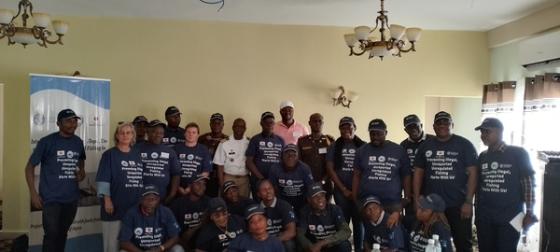Liberia: Stakeholders Brainstorm on Sustainable Fisheries

The fisheries sector of Liberia has the potential to significantly contribute to the economic growth and food security of many Liberians.
According to the National Fisheries and Aquaculture Authority (NaFAA), the sector currently contributes approximately 12 percent of Liberia’s Gross Domestic Product (GDP) and provides employment for over 33,000 individuals, including fishers, fishmongers, and processors staying along the coastal communities.
But Illegal Unreported and Unregulated Fishing (IUU) activities continue to remain a serious challenge.
As part of an effort to reduce IUU fishing in the territorial waters of Liberia, fisheries stakeholders recently concluded a 3-day interagency workshop in Marshall, Margibi County.
The workshop aimed to draft a Memorandum of Understanding (MOU) and a Term of Reference (TOR) geared toward bringing stakeholders together for the effective implementation of the PSMA.
PSMA is a global legal instrument that aims to prevent or eliminate IUU fishing by restricting vessels engaged in such activities for using ports and landing their catches.
Liberia has since signed the PSMA legal instrument but its implementation remains weak.
The workshop was organized by the United Nations Food and Agriculture Organization (FAO) in collaboration with the National Fisheries and Aquaculture Authority (NaFAA).
It brought together participants from some key government line ministries and agencies, including Maritime, Ministry of Defense, National Port Authority (NPA), Liberia Revenue Authority (LRA), Ministry of Commerce and Industry (MOCI), the National Fisheries and Aquaculture Authority (NaFAA), APM Terminals, the Liberia National Police (LNP), as well as leaders from the Co-management Associations (CMAs), fishermen and fish mongers and other stakeholders.
Speaking at the close of the workshop on behalf of the FAO Country Ad Interim Representative, Bintia Stephen Tchicaya, the National Project Coordinator and Partnership Specialist at FAO, Emmanuel Kapee said that the fisheries sector of Liberia is important because of its current role in strengthening the food security of Liberians.
According to him, the sector contributes to food security by ensuring about 65% of the national protein needs of Liberians.
He also mentioned that fisheries serve as a significant source of employment and livelihood of many people in fishing communities as well as represents an opportunity of revenue generation for the country.
“IUU fishing poses a significant threat to the marine ecosystems and undermines national and regional efforts to manage fisheries sustainably,” Kapee said.
This situation, according to Kapee, shows that fighting IUU fishing must be a national priority that requires a collective involvement of all.
Kapee mentioned that he strongly believes that the workshop is part of his institution's lasting solution in reducing IUU fishing.
“We have come not only to review and reinforce the Inter-agency Corporation but to revise and update mechanisms that can quickly be adopted to ensure that Liberia is the best position to fight IUU fishing in a unified way,” he said.
He mentioned that FAO remains steadfast in its commitment to combating IUU fishing globally.
“We stand ready to support and strengthen the government of Liberia’s efforts in this vital endeavor,” he said.
However, Kapee stressed the need to unite efforts in mobilizing resources to combat IUU fishing effectively.
“We must safely guide our marine resources for the current and the future generation to benefit fully from the economic potential of the fisheries sector,” he mentioned.
For her part, the Program Officer-Green Team Delegation of the European Union to Liberia, Maria Winnubst, challenged local fisheries stakeholders to take the fight against IUU fishing seriously.
“All of you have a role to play to safely guide your waters to make fishermen to sustain their incomes. I understand that Liberia is one of the countries with the biggest fish stock in the region,” he said.
According to her, all stakeholders have a crucial role to play in order to safeguard the lives of fishermen.
She called on authorities of the fisheries sector to make sure that the fisheries management plan is working effectively.
“I want to encourage you to work together to safely guide the lives of fishermen and their children. You must take the PSMA seriously to make your country one of the best in the region,” she emphasized.
The Deputy Director for Technical Services at NaFAA, William Y. Boah, said that though Liberia has signed an agreement to end IUU fishing, much still needs to be done.
“It requires all stakeholders to work together collectively. This draft MOU is meant to bring us together to find a way for a sustainable fisheries sector. There is a need for us to fight together to manage the resources of our waters,” he said.
He said that the regional fisheries committee of West Africa was helping to manage fisheries sustainably and they are looking for the potential to support stakeholders from member countries.
He used the occasion to extend thanks to the European Union for its numerous support to the fisheries sector of Liberia.
Meanwhile, the workshop participants have agreed to further review the proposed documents and later derived a conclusion toward their approach in implementing the PSMA.
